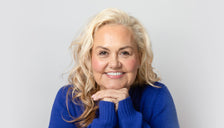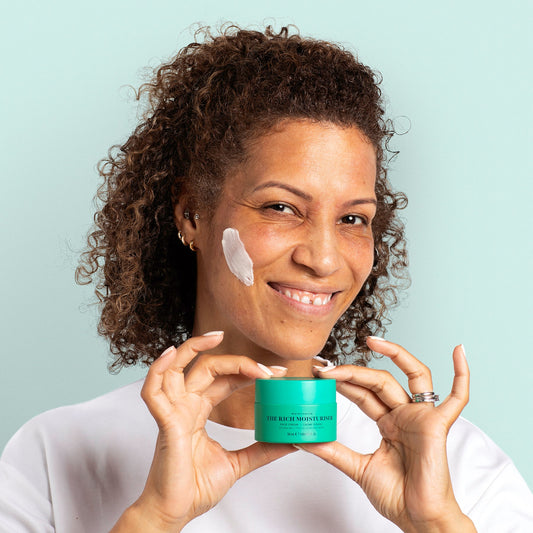Caroline Hirons was always destined to go into the beauty industry – she just didn’t know it.
“My earliest memories are of my nana taking her makeup off,” she says. “Both my mum and my grandmother worked in beauty, but weirdly it never occurred to me that I would. Because I just couldn’t see myself doing it. I didn’t really know what I wanted to do. I wanted to be a teacher, but that went out the window when I saw, as a teenager, how teachers were treated. Then I wanted to be a midwife. Then I had a kid and that went out the window,” she laughs.
But after she had children, retail seemed like a good option: “part time, ad hoc, the sort of thing you can’t do with a newborn but when they’re six months and you want to get back to work for a couple of hours on the weekend.” She’d previously done stints in Liberty and Harrods – “all over the shop, including haberdashery. There is nowhere you want to be less than the haberdashery department on stock-take day. I cannot tell you how many buttons I’ve counted in my life” – but beauty appealed. A quick call to a contact in the business landed her with a weekend job on the Aveda counter in Harvey Nichols, and the first Sunday she was working on her own, she took more money than the whole team had taken the day before.
“I just felt I knew what I was talking about when it came to skincare, because I’d grown up listening to my mother and grandmother talk about it.”
She swiftly moved through the ranks, becoming a manager on the counter, then being poached by Space NK.
“I was obsessed with research and I would just read everything – if it was skincare. Colour, I couldn’t care less, I was all about skincare. And I realised that if I was going to do this seriously, I needed to learn more.”
And so while juggling three children, pregnancy and a full-time job, Caroline went to night school, studying anatomy and physiology and eventually qualifying as a therapist. A chance meeting with the founder of Chantecaille led to her joining the brand as they were launching skincare, and roles with Liz Earle and Clarins followed until, in 2009, she set up her own consultancy, advising beauty brands.
But, if it hadn’t been for Twitter, you probably wouldn’t be reading this now.
“I was on Twitter in the early days when you just used to follow your friends. And occasionally people would ask me questions about skincare but you only had 140 characters back then and you can’t tell someone how to wash their face in 140 characters. So when someone said ‘just blog it’, I did. And my very first post was on how to do a cleansing massage – it’s still up there! I remember sitting in front of a table lamp and getting my son to click the camera when my hands were in the right position. And once it was up, I kind of thought ‘Oh this is a nice avenue to put out good information, not rubbish and following the trends’.”
Slowly the blog grew, but it wasn’t until industry friends told her that her recommendations drove sales that she realised quite how successful it had become.
“I remember when I was in Space NK and Nigella Lawson had a beauty column for The Times. And if you were on shift on a Saturday, the first thing you did was get the magazine to see what she’d recommended and if you had enough stock, because you knew it would sell out. So when I started to get that kind of feedback from brands, I realised what I had on my hands.”
As a result of the blog, Caroline was asked to put together boxes with other brands, and the hugely popular seasonal kits – collections of products on sale at a far lower price than the individual components – came from there.
“I knew how the system worked, I knew how to put it together. I already knew warehouses and packaging people and graphic designers from working in the industry with brands. I thought, ‘Why don’t I just do it myself?’.”
Because Skin Rocks started with the monthly boxes, it would be easy to see it as being an extension of the kits, but Caroline is adamant that it’s not “a kit brand.”
“Purely and simply, it started with the boxes because the website wasn’t ready and the boxes were.”
But while the kits are “a great offer”, the boxes are designed to be educational.
“They’re not for everyone: they’re target-driven, they’re treatment-driven. So I hope it’s really clear that the very first one was about acids, and the idea was that: ‘You need acids in your skincare routine if your skin is like this, you don’t want acids in your skincare routine if your skin is like that, and if you do want to start using acids in your skincare routine, here’s not just an acid product, but an entire regimen to complement it’.”
And that sense of education is really the cornerstone of Skin Rocks.
“Skin Rocks came from wanting to get across a message about skincare in a way that wasn’t about me. I’m still going to have my blog, I’ll still be reviewing products, but I want Skin Rocks to be a resource. There is so much fear-mongering misinformation that, in recent years, has been left unchallenged and allowed to gather momentum as fact, and I wanted something that would be the counterpoint of that. I want it to be somewhere where people can learn about skin, about what they need for their skin and, more importantly, about what they don’t need.”
And for Caroline, it was important that that message came from a range of voices.
“Not everyone is going to like me. Why would they? I don’t like everyone. So if someone who doesn’t like me sees me talking about the importance of SPF, they may take absolutely no notice. But if 15 different derms are saying it on Skin Rocks, I’d hope that they’d pay more attention to it.”
So, on the Skin Rocks site, you’ll find the same core values that the blog has always had, fact-led, no-nonsense skincare advice, but with a range of experts delivering authority, authenticity and science.
And for Caroline, that collectivity was important.
“If you’re a single person, you’re easily dismissed, but if you’re a website or a movement, you hold more sway. I want to have people on board who, if a story comes out or if there’s an ingredient everyone’s raving about, or if, for example, the Gwyneth SPF situation happens, we can react to that. I would like it to be a place where people go to find out ‘What does Skin Rocks have to say about this? What do the professionals have to say about this?’”
She also wants to reinforce how professional the beauty industry can be.
“Everyone who answers a skincare question on the Skin Rocks Instagram page is a qualified facialist. There’s a customer service team, but if it’s a skincare question, it goes to a professional.
“I want people to know that beauty isn’t a game, people aren’t just after your money. It’s not all about marketing. My friends in the industry have no interest in putting people down, especially women. They have no interest in making you look or feel older, but it is dictated to and the language is still largely dictated by sales and corporate retail. And that is what I would hope to leave some dent in. I would like to just dent their bumper. You know, I’m not for a second thinking I’m going to change the way of the world, but I would like to be an irritating mosquito in the ear of big corporate.”
I can pretty much guarantee a number of big corporates will confirm that she’s already succeeded in that, but the boxes and the website are just the beginning…
“I don’t want to be one of those people who says ‘I can’t say any more…’ but basically until it’s ready, I’m not going to say any more. But there’s more to come, much more.”


























